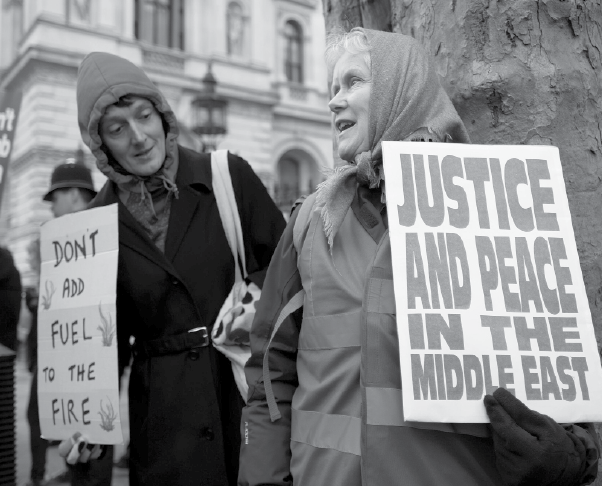Modern terror
What ISIS really wants
December 9, 2015
With endless breaking reports on terrorism throughout the international community, the Islamic State of Iraq and Syria (ISIS) has become the most infamously discussed terrorist group as of late.
Suffolk University Professor and Director of Graduate Program in Ethics and Public Policy, Dr. Nir Eisikovits, discussed the future plans, goals, and challenges ISIS may face in upcoming years.
Eisikovits taught a seminar this past summer that focused on ISIS and continues to conduct his own research on their political philosophy. He specifically looks at how original it is, or whether it is recycling older political philosophies that have animated other terror groups.
“They subscribe to an extreme apocalyptic version of political Islam that is very far from the mainstream of political Islam,” said Eisikovits. “They believe the end-time is arriving soon in which there will be a battle between believers and non-believers, and they are trying to do everything they can, according to their understanding of Islamic scripture, to bring about that end-time sooner rather than later.”
Established in October 2006, ISIS is a result of a grandiose fusion of multiple smaller groups, predominantly al-Qaeda’s Iraqi branches along with other local Iraqi Islamic groups, according to Al-Monitor, a news source for Middle East activity.
ISIS moved into Syria after the spark of the revolution during a civil war between its people and government. From there, ISIS acquired more power, territory, and resources.
The militant group now dominates local populations and areas in Syria and Iraq. A significant rise in power in the Middle East gives ISIS a chance to cultivate their terrorist ideologies.
In terms of ISIS’s plans on possibly engaging with or attacking the U.S., there have been a multitude of empty threats. However, these threats may not be as minimal as they seem, Eisikovits said.
“The U.S. is already gradually trying to decide how much of a ground-level commitment it wants in the fight on ISIS,” said Eisikovits.
Currently, involvement is primarily air-support and a small number of some special forces.
“If there was a spectacular huge attack like there was in Paris, I think there would be a huge political pressure on the Americans to be actively involved on the ground,” said Eisikovits.
Their ideology proves powerful as ISIS gains ground as Arab nations experience governmental chaos and weakness.
What makes ISIS even more powerful is not only weakness within Arab governments, but also the lack of pushback and resistance from either Arab or Western states, according to Eisikovits.
Refugees from Iraq and Syria have a heavy stigma attached to them as they are immigrating to other nations, not just to the U.S.
Eisikovits said it’s exactly what ISIS wants.
“When refugees are turned away, they get sent back and they remain a part of the chaos,” said Eisikovits. “They know people are suspicious of Muslims here, and I think people are very ignorant about Islam and they are usually incapable of making distinctions between the vast majority of Muslims who want nothing whatsoever to do with this.”
As ISIS was initially founded as an al-Qaeda splinter group, differences between ISIS and al-Qaeda in terms of political philosophies can be distinctive.
Eisikovits pointed out that ISIS is more focused on creating an Islamic caliphate and a Muslim civil war, while al-Qaeda had put more efforts toward attempting to kill Americans and win over the minds of Muslims across the globe.
ISIS hopes to form a civil war inside the Ummah, or in the nations of the Arab world between Sunnis and Shias, and between Sunnis among themselves, Eisikovits said.
“The belief and the hope that they have is that this would cleanse the Ummah, cleanse the Arab nations, cleanse the larger Muslim nations, and bring about this final, purifying apocalyptic battle that they believe in,” said Eisikovits.
Exactly how ISIS recruits their members is directly linked to their power through social media, and place a heavy focus on radicalizing young people through these platforms.
Eisikovits said ISIS has users occupying Twitter as well as other more private online spaces in order to engage in communication with potential new members.
ISIS focuses a great deal of energy into selling fear and chaos, while trying to attract foreign powers to invade its territories, according to Eisikovits.
“ISIS sees that as a fulfillment of the prophecy, the armies of apostate religions are going to come to Syria and Iraq for a final, standoff battle,” said Eisikovits.
How ISIS acquires their income and resources heavily depend on oil fields in Iraq and Syria that are within their controlled areas, and taxing populations under their control, according to Eisikovits.
“They used to get a lot of [money] from selling oil to many of the players in the Syria and Iraq regions, taking over oil fields and selling oil,” said Eisikovits. “Now, that’s curtailed and a lot of it comes from taxation and extortion from the areas that they control.”
With the ongoing stance Western governments have taken on the fight on ISIS, Eisikovits foresees them as an even more powerful pawn in the Middle East in the near future, and will continue to take steps to progress internationally.








